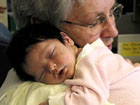
Making Every Moment Count 2003
Distributed by Fanlight Productions, 32 Court St., 21st Floor, Brooklyn, NY 11201; 800-876-1710
Produced by Leora Kuttner, PhD
Director n/a
VHS, color, 39 min.
Jr. High - Adult
Death and Dying, Health Sciences, Nursing, Social Work, Psychology
Date Entered: 06/21/2005
Reviewed by Nicole Cooke, Montclair State University, Montclair, NJMaking Every Moment Count bravely tackles the delicate and painful topic of palliative care for dying children (palliative care is also known as end-of-life care). As is questioned in the opening frame of this documentary, why does a film have to be made about this topic? Why isn’t palliative care a more viable and well-known option to parents and caregivers? Perhaps the answer is that society doesn’t want to dwell on pediatric illnesses or because they simply aren’t aware of palliative care for children? Pediatric palliative care is just coming into recognition in the medical community. Hence the mission of this documentary, created by film maker and psychologist Dr. Leora Kuttner, is to emphasize that death is not just for adults and to educate all parties on the benefits of palliative care.
The documentary highlights five very special children and their families, all of whom have embraced the emotional and psychological stress of illness, working though them as they battle their illnesses. When children are terminally ill, they are lost to their families in “gradations,” prolonging and complicating the grieving process. But, with the proper emotional support from family and health professionals, the dying process can have cathartic and healing benefits, for both children and adults.
In addition to featuring the children and their families, the film focuses
on the professionals who treat these pediatric life-threatening illnesses.
Health care professionals, including doctors, nurses, social workers and
aides, cannot rely on their clinical experience; instead, they must draw
from within, focusing on the comfort and quality of life of their patients.
Their task is to be with these children and not try to “fix” them.
The technical components of this documentary are average, not quite matching
the quality of the content; the film’s audio component is good, but the
visual editing is choppy at times and not concise enough at other points in
the film. Despite the editing flaws, Making Every Moment Count is really
enlightening and should be shared with pediatric patients (those who are old
enough to comprehend), their families (including siblings), and most
importantly, it should be shared with medical professionals who treat
children. Making Every Moment Count is recommended, and is best suited for
medical libraries and patient education collections.
Awards: